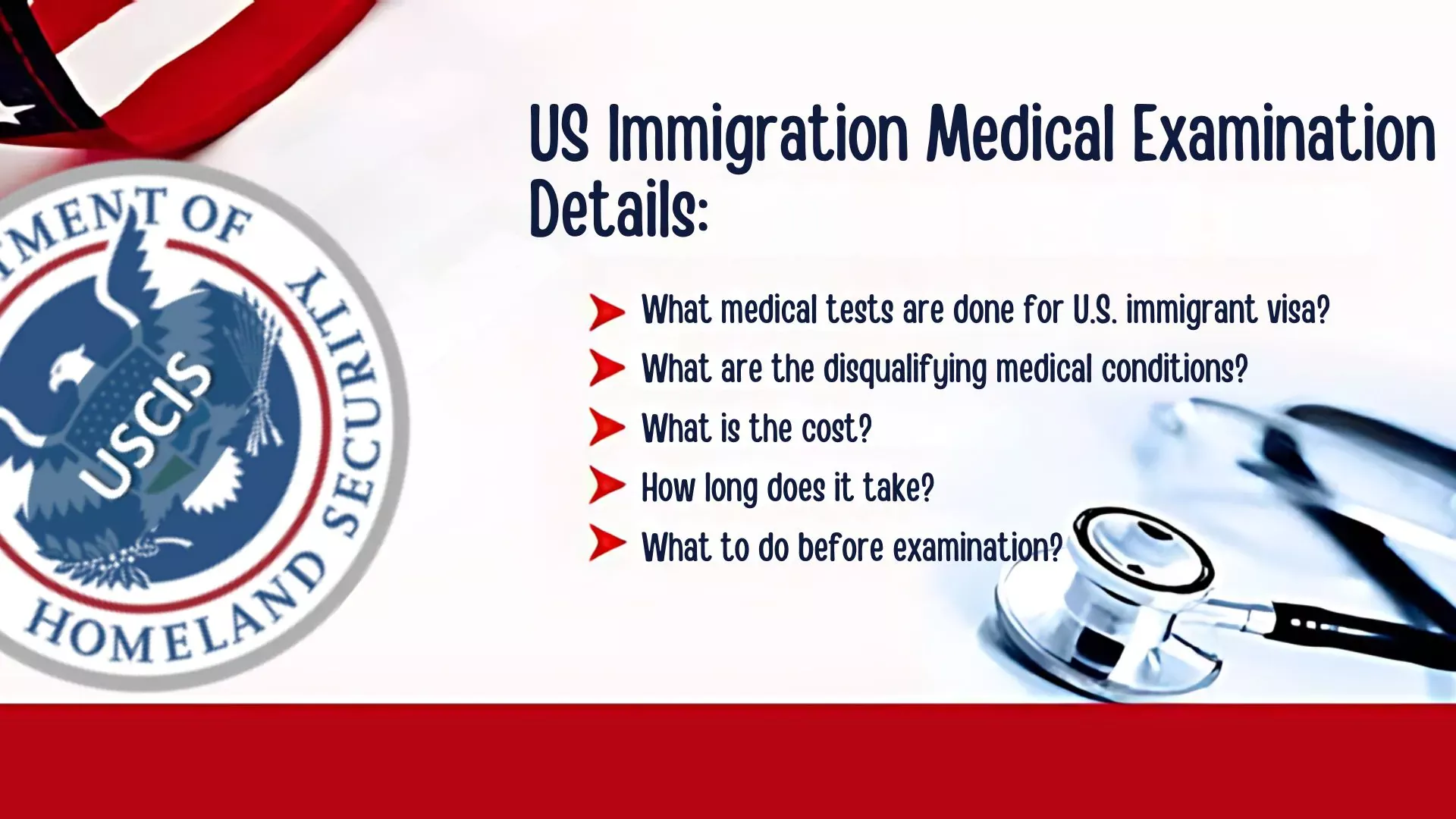To get a green card to live in the United States, you usually have to go through the U.S. Immigration Medical Examination.
During your medical examination, a civil surgeon checks your health to ensure you don’t have any serious medical problems that could prevent you from coming to the U.S.
US Immigration Medical Examination: All You Need to Know
It’s an essential step in the process of immigration. Some important questions related to the US Immigration Medical Examination are given below, along with their answers.
What medical tests are done for U.S. immigrant visa?
US Immigration Medical Examination done for U.S. immigration visas focus on two main areas: identifying contagious diseases and ensuring you don’t have certain conditions that could pose a public health threat.
Here’s what they check in a US Immigration Medical Examination:
Communicable Diseases:
During the US Immigration Medical Examination, doctors will screen for infectious diseases. These are diseases that can easily spread from person to person and pose a risk to public health.
- Blood Tests:
- Syphilis: This test is mandatory for applicants between 18 and 44 years old.
- Gonorrhea: This test might be required for some applicants between 18 and 24 years old.
Tuberculosis Screening:
This is important to prevent the spread of TB. Depending on your age, they might perform:
- Chest X-ray: Standard for applicants over 15 years old.
- Interferon Gamma Release Assay (IGRA): This blood test can be an alternative to the X-ray, particularly for children aged 2-14.
Other Considerations:
- Vaccinations: While not a test, verifying all the required vaccinations is part of the US Immigration Medical Examination process. Common vaccinations include Measles, Mumps, and Rubella, Varicella, Tdap, polio, influenza type B, and meningococcal meningitis.
- Physical Examination: During your US Immigration Medical Examination process, the doctor will likely perform a general physical exam to assess your overall health.
- Mental Health: They might ask questions about your mental health to identify potential concerns.
- Drug and Alcohol Screening: This may be included in some cases.
Note: This is a general overview, and specific requirements might vary depending on your age, medical history, and other factors.
What to do before an immigration medical exam?
Here are some important things to do before your US Immigration Medical Examination process:
Gather Required Documents:
- Identification: Your passport or a government-issued photo ID is essential.
- Appointment Letter: The document confirming your exam appointment with the civil surgeon.
- Medical History: Any documents you have regarding past illnesses, surgeries, treatments, and vaccinations.
- Vaccination Records: Proof of your vaccinations, especially for Measles, Mumps, Rubella (MMR), Varicella (chickenpox), Tdap (tetanus, diphtheria, and pertussis), polio, influenza type B, and meningococcal meningitis.
- Payment: Check with the doctor’s office beforehand to confirm payment methods for the exam fee.
Prepare for the Tests:
- Age Exceptions: Children under 15 typically don’t require blood tests or chest X-rays. However, confirming with the civil surgeon or USCIS website is best.
- Pregnancy: If you’re pregnant, discuss postponing the chest X-ray with the embassy or consulate and the civil surgeon. Alternative tests might be available.
Schedule Strategically:
- Validity of Results: USCIS generally requires the medical exam results to be valid within a specific timeframe, often 60 days. Schedule your exam close to when you file your application.
Be Open and Honest:
- Answer the doctor’s questions openly and honestly during the medical history review.
What are the disqualifying medical conditions for U.S. visa?
There are two main categories of medical conditions that can disqualify you from a U.S. visa:
- Infectious Diseases of Public Health Significance: These diseases can quickly spread and risk the public’s health. Some examples include:
- Physical or Mental Disorders with Associated Harmful Behavior: Self-harm or Harm to Others. A history of harmful behavior associated with mental illness may be considered.
- A mental disorder with a history of violence or self-harm
- A physical or mental disorder that significantly limits your ability to care for yourself
- Additional Considerations:
- Untreated tuberculosis (active TB)
- Syphilis (if not properly treated)
- Gonorrhea (if not properly treated)
- Hansen’s Disease (Leprosy)
- Public health emergencies like certain strains of influenza
- Drug Abuse or Addiction: This is another disqualifying condition.
Here’s what doesn’t disqualify you:
Having a controlled medical condition, as long as it’s well-managed and doesn’t pose a public health risk or require significant resources.
What is the cost of a medical exam for a U.S. visa?
The cost of a US Immigration Medical Examination can vary depending on several factors, including:
- Location: The fees charged by the civil surgeon (the authorized doctor who performs the exam) can vary by country and city.
- Age: The tests required can differ by age, with some tests being more expensive than others. For instance, children may not require specific blood tests or a chest X-ray.
- Additional Tests: There could be extra charges if further tests are needed due to your medical history.
Here’s a general idea:
The cost typically falls somewhere between $200 and $500.
How long does it take to get immigration medical exam results?
The time for receiving your result of the US Immigration Medical Examination can vary depending on a few factors:
- Civil Surgeon’s Report: This should be ready within 7-10 business days following your exam.
- USCIS Processing: After receiving the report electronically, USCIS usually takes additional time to process it. This can depend on their current workload. It may take 2-4 weeks under normal circumstances.
Here are some additional resources:
- USCIS Form I-693: https://www.uscis.gov/i-693
- U.S. Department of State travel.gov: https://travel.state.gov/content/travel/en/us-visas/immigrate/the-immigrant-visa-process/step-10-prepare-for-the-interview/medical-examination-faqs.html
- USCIS Policy Manual Volume 8, Part B – Health-Related Grounds of Inadmissibility: https://www.uscis.gov/policy-manual/volume-8-part-b
- The U.S. Department of State website (https://travel.state.gov/)
